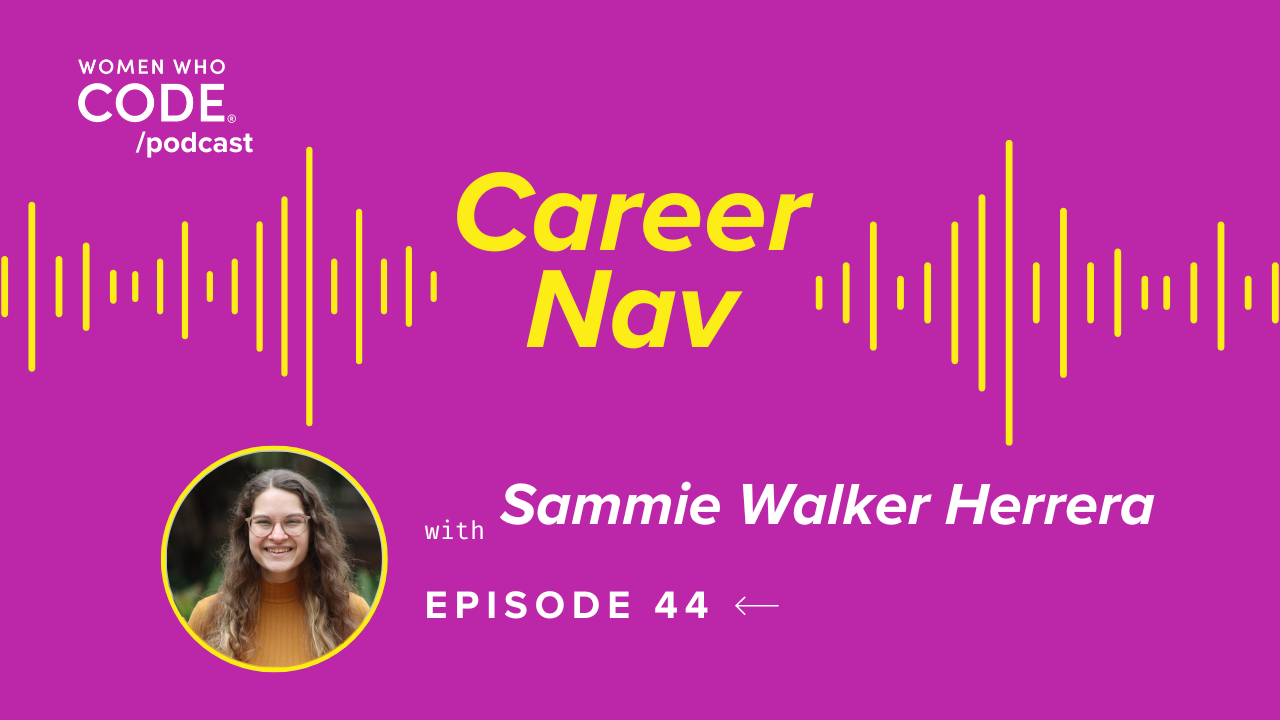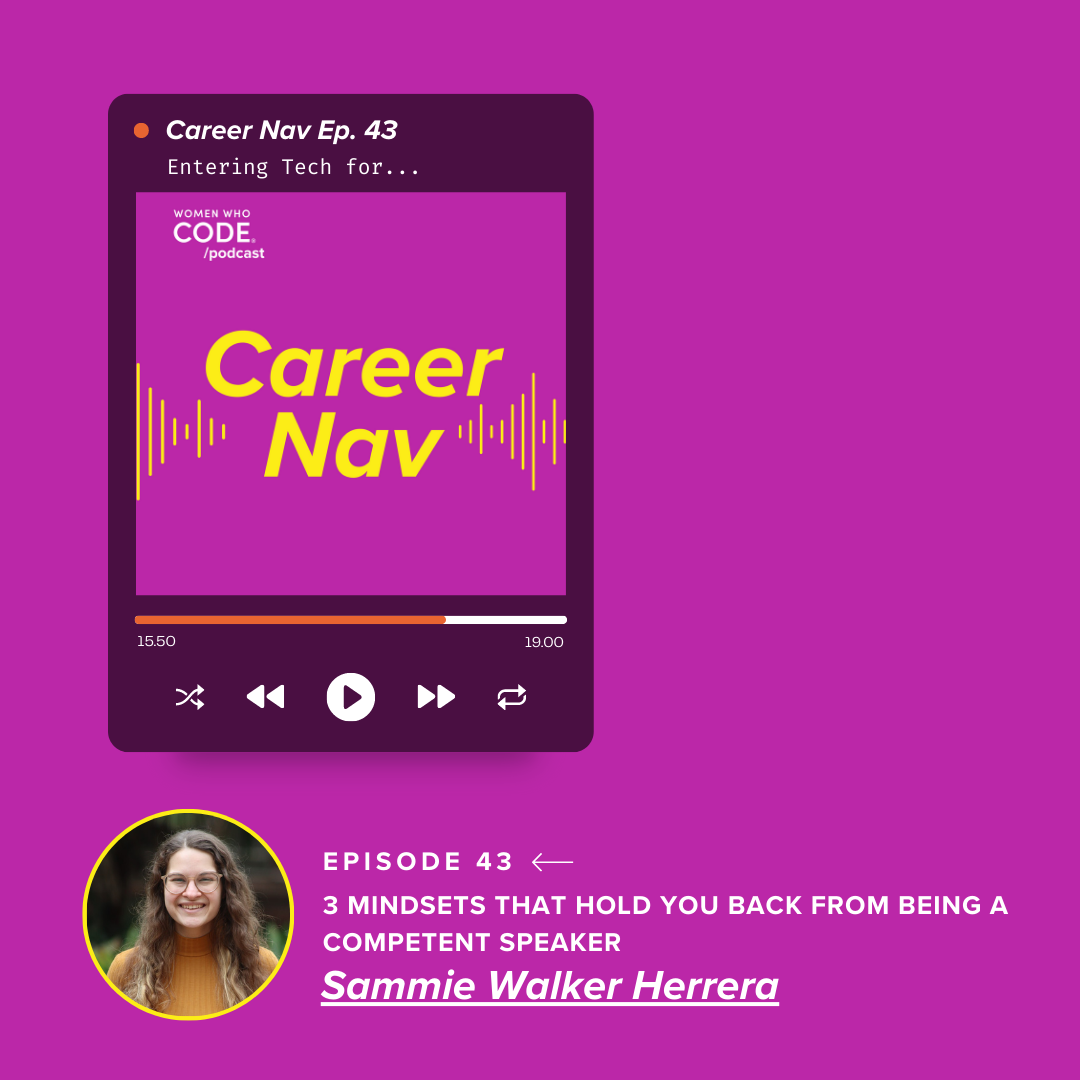Career Nav #44: 3 Mindsets That Hold You Back From Being a Competent Speaker
Written by Sammie Walker Herrera

Women Who Code Career Nav 44 | Spotify – iTunes – Google – YouTube – Text
Sammie Walker Herrera, Founder of Speak Y’ALL, a public speaking coaching and career confidence training organization, shares her talk, “Three Mindsets that May be Holding You Back from Confident Speaking.” She discusses limiting beliefs around public speaking and shares exercises you can practice to grow past those beliefs.
Sammie Walker Herrera, Founder of Speak Y’ALL, a public speaking coaching and career confidence training organization, shares her talk, “Three Mindsets that May be Holding You Back from Confident Speaking.” She discusses limiting beliefs around public speaking and shares exercises you can practice to grow past those beliefs.
I work with about 60-plus leaders in organizations like Amazon, Google, Oracle, Microsoft, Snap Inc, and Scotiabank. I help folks build their speaking confidence and reach their next career level. Wouldn’t it be nice if you could speak up in meetings, address your concerns with a supervisor or even someone on the C-suite, and finally submit that conference presentation to Women Who Code and be so excited to speak? It’s not always that easy. A lot of things can get in our way. Sometimes that’s how we view ourselves, talk about ourselves, what we can contribute, what we know, how we can help other people, and even if we don’t feel like we belong in the spaces we’re interested in speaking up in.
The first one I hear consistently from folks of all genders and levels is, “I am shy, or I’m an introvert.” Shyness is something that someone can have regardless of their personality type. There are many articles, podcasts, and media regarding extraversion and introversion. Some extroverts are shy. That may surprise you if you’re an introvert or an ambivert. Some extroverts don’t like being in the spotlight. Then you think about introverts, whether you’re an introvert or not, you think of some folks who take a little bit more time to warm up to new folks or in new environments, but you see them chatting, laughing, gesturing, being huge talkers, prominent speakers when they’re around people that they’re comfortable with.
I’ve seen many introverted leaders who feel comfortable leading their teams and meeting their peers and colleagues. They built solid relationships with them. Shyness is often related to excellent listening ability, which is a very underrated speaking skill. When folks are speaking, they want to know that not only were they heard, but they were understood as well. Many people who may be a bit shy or more in the background often listen to ensure they know the emotional tonality and the next steps. Understanding those critical underpinnings of what makes humans tick or what moves an organization forward can often help someone be a really strong speaker.
When I think about feeling shy, I think about someone I worked with who described herself as extremely shy. She described herself as introverted and quiet. She also had many filler words, stammering or stumbling in her speech. She decided to work on her public speaking. Her goal was to have a dynamic presence. She wanted to be considered a leader in her organization, mainly because she worked at a government agency. It was male-dominated and related to global crime, where they needed a strong tonality of certainty when presenting reports.
Often we’re afraid to hear our voices. We’re so scared to listen to the recordings of Zoom meetings where maybe we’re leading or participating. That’s normal and fine. You might not know if you have that softer voice unless you’ve gotten feedback from others. There’s nothing wrong with having a softer voice when what you’re discussing demands a more soothing voice. My recommendation to practice your voice and to practice your volume is to pull out a book. Maybe for a page, you speak at your regular volume. You read through that book page for a little bit. The goal is now to try speaking at a nine or a 10. This is not quality, just volume. Often just raising your voice can cut out a lot of stumbling. You feel and embody a lot more confidence. If you’re unsure you’re a nine or 10 level, amp it up a couple more levels and see how that feels. It’s about building a range, a volume so that you can use that in your reporting and storytelling.
Maybe you don’t speak up because you’re unsure what to talk about. The second mindset holding people back from public speaking is, “I don’t have anything new to say.” That mindset is limiting. We’re in ChatGPT and many other AI tools that help us structure our conversations or conference presentations. There are a lot of discussions regarding originality, ethics, and research where you’re getting specific information, and the goal is not to lie. The goal is not to make something up so you have something 100% original or 100% new to say.
One exercise is to share random images from a random image generator site. They can be AI-generated art pieces and very odd photos out in the world. Look at a picture for a few seconds and create a message that’s not more than ten words. If nothing comes to you, that’s okay. This training exists because it’s a muscle that needs to be practiced to build messages out of things you see in your life, to build meaning out of the ordinary. Public speaking does not come naturally to most people. Fantastic public speakers aren’t always the people who naturally speak very well. They are someone who realized they had a message they wanted to share and then built the skills to learn how to relay that message through spoken word. There are so many ways to take from something and take it somewhere new.
The last mindset I want to share with you is, “I don’t belong here. They’re going to find out I’m a fraud”, or what’s better known as imposter syndrome. I didn’t have a technical background going into my undergraduate experience at Carnegie Mellon University, which is known as a significant technical school. I was studying psychology. I had to break through my imposter syndrome feelings. I was able to let go of that mindset after really thinking I could make my impact in a completely different way. Now I impact the technological world by working with folks on their speaking skills. Sometimes that journey is a bit longer than we may think, but it takes us to where we need to go. We must believe in ourselves and let go of that imposter syndrome as it pops up.
One way to flip that mindset regarding imposter syndrome is to think of your mentors, supervisors, sponsors, and other folks who’ve believed in you and championed you taking this path that you’re taking in your career. Do you believe in their competence? Do you believe in their ability to judge someone correctly and ensure they can take that next step? They’re not going to risk their reputation. They’re making sure they connect with folks they see strong potential in and who can do that next step. Believing in them hopefully helps you believe in yourself as well. I know that seems like quite a bit of a mindset shift. Letting that sink in takes a bit of time, but I hope opening that question is helpful when addressing imposter syndrome.
***************
Guest: Sammie Walker Herrera, Founder, Public Speaking & Confidence Coach | Speaker, Speak Y’all
https://www.linkedin.com/in/sammiemlwalker/
Twitter: @speakyall and @sammiemlwalker
Instagram: @speakyall and @sammiemlwalker
YouTube: @speakyall and @sammiemlwalker
TikTok: @speakyall and @sammiemlwalker
Website: http://www.speakyall.com/
Producer: JL Lewitin, Senior Producer, Press and Digital Content, Women Who Code
